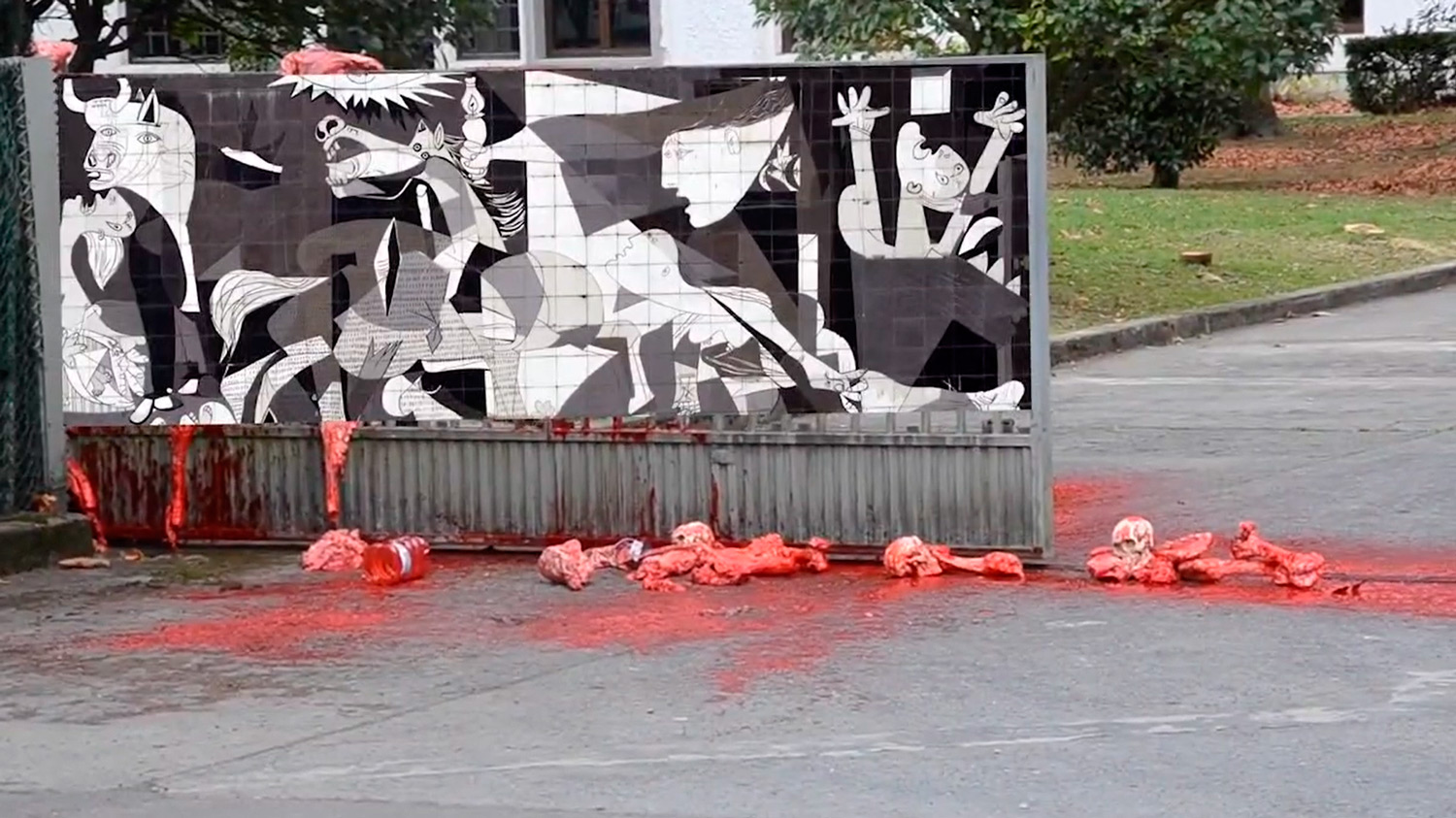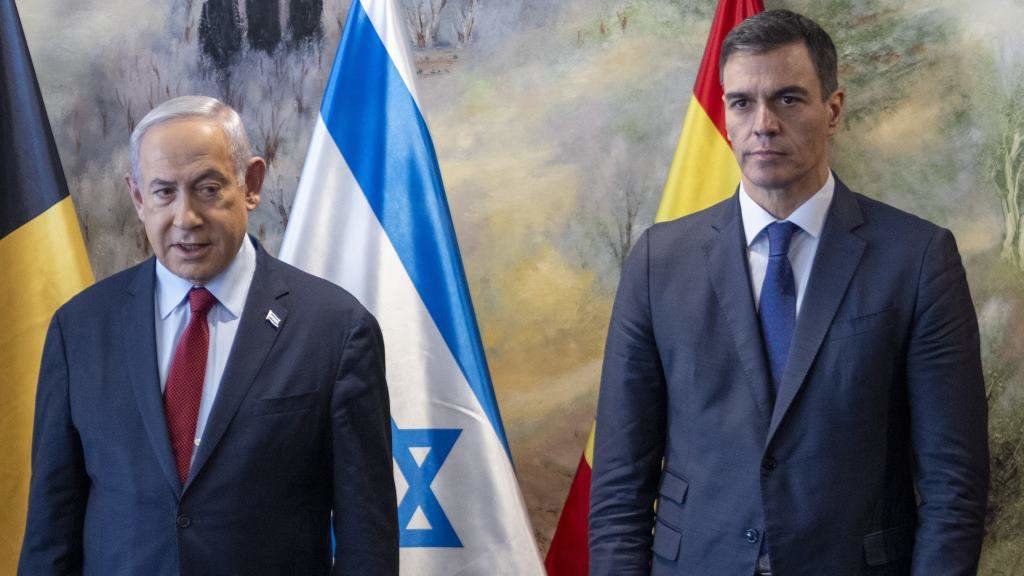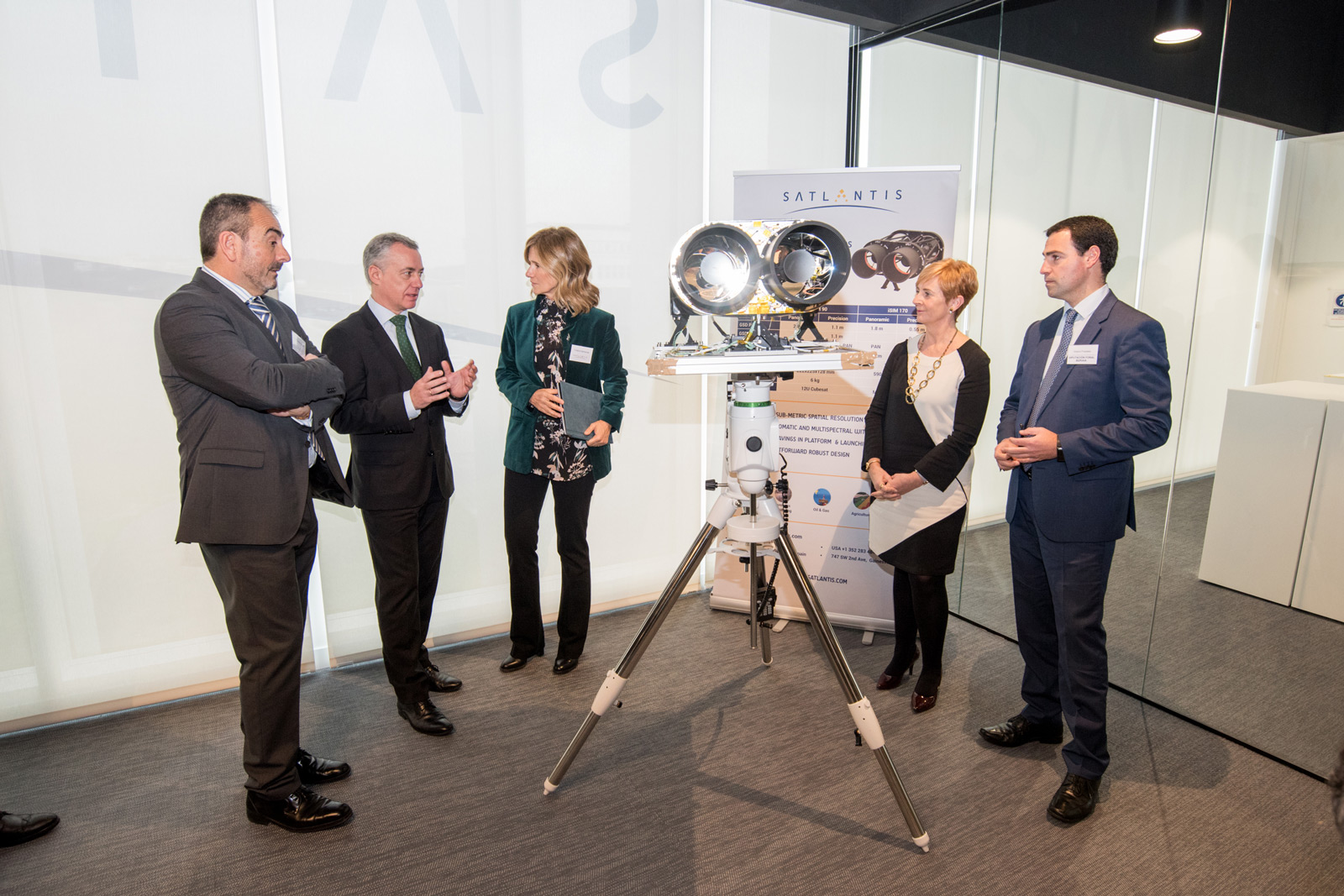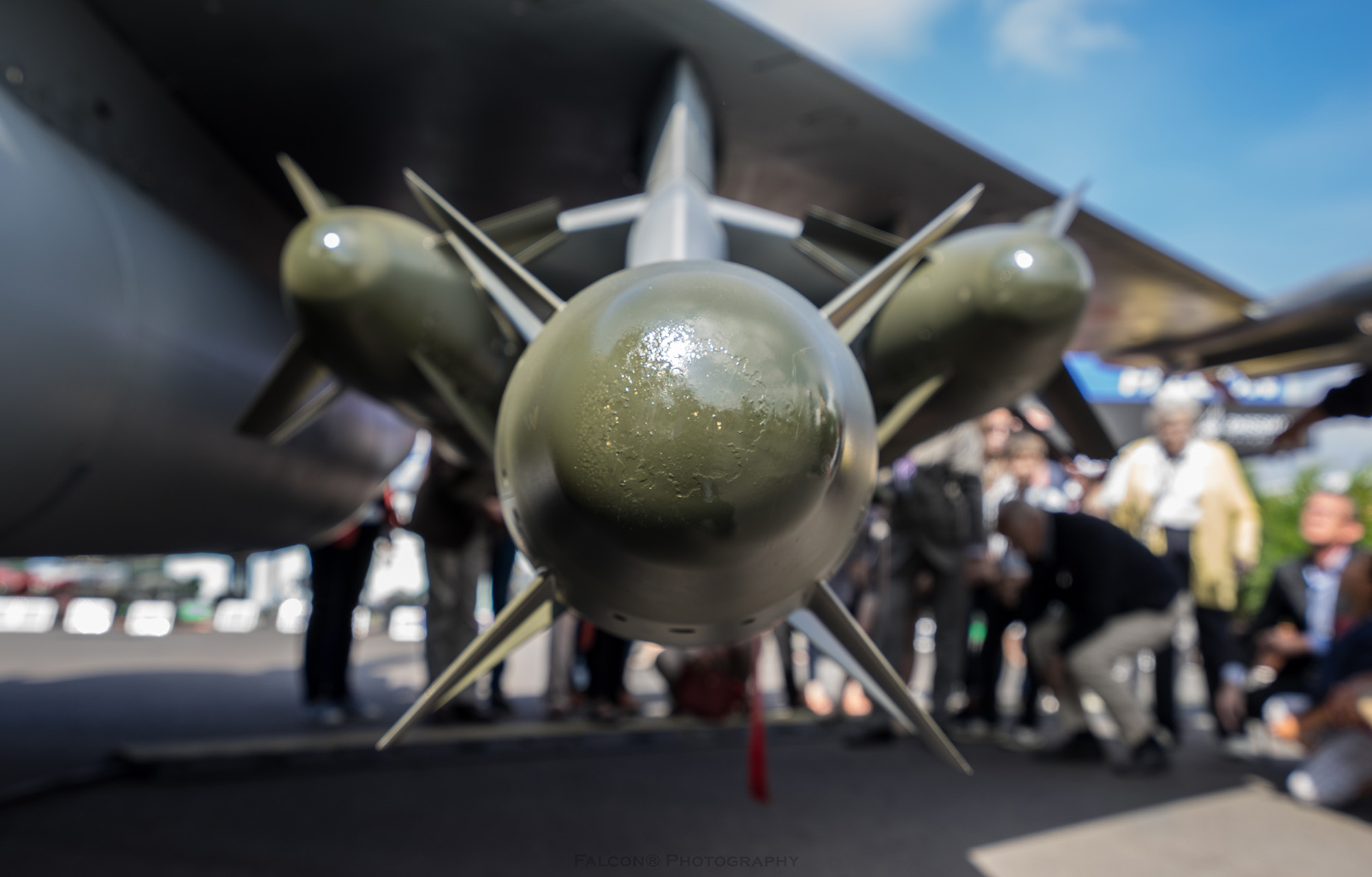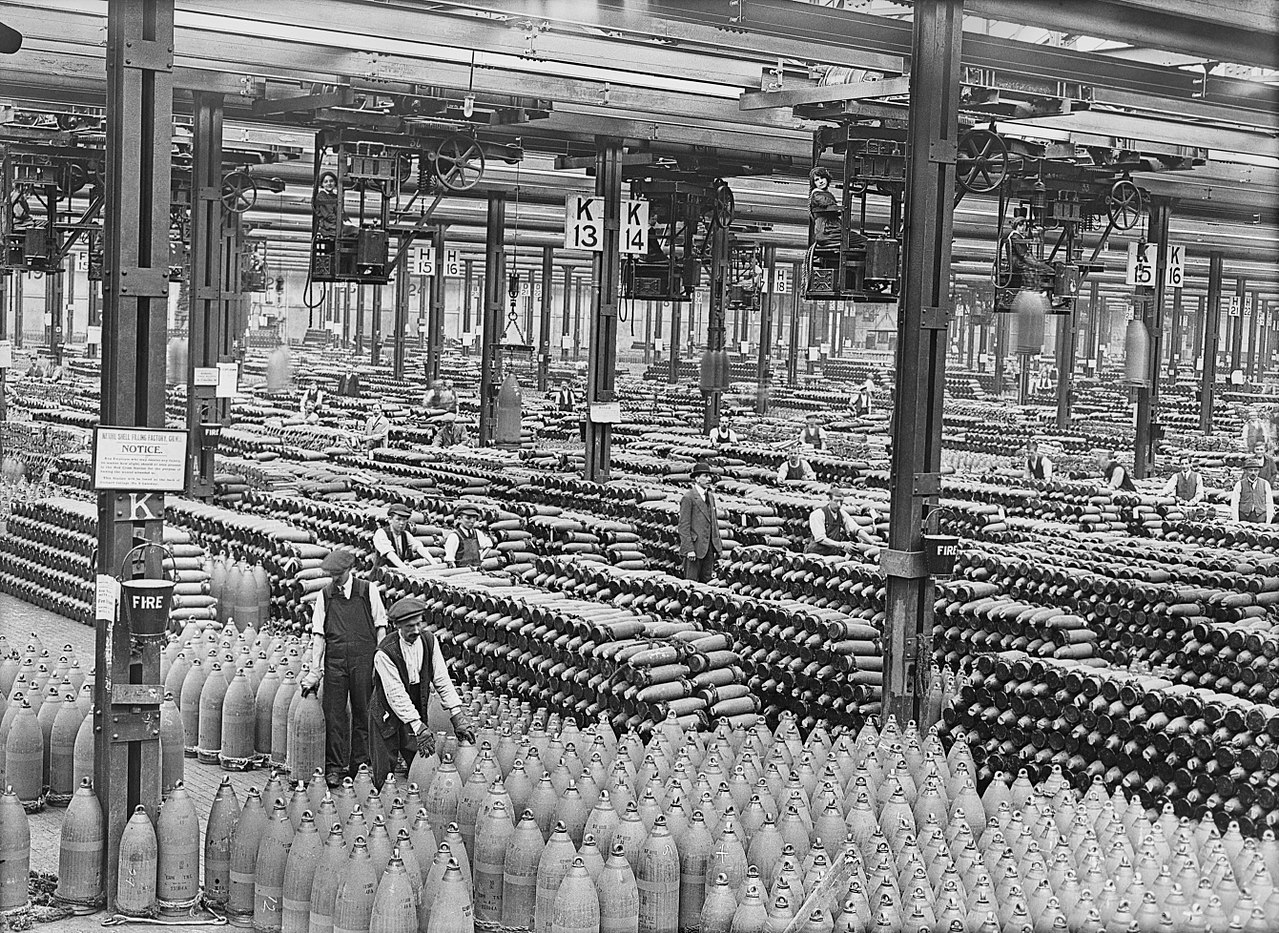At least 100 companies involved in arms manufacturing in Euskal Herria
- In 2021, the industry's leading aeronautical cluster, HEGAN, reached a turnover of 14,186 workers and 1,867 million euros, representing 1% of the GDP of Álava, Bizkaia and Gipuzkoa and 2.4% of industrial employment. Companies in the three territories occupy the fifth place in the Spanish State's arms industry, the seventh largest export weapon in the world.

Nearly 100 Basque companies are directly involved in the production of weapons, according to the anti-militarist group in Vitoria. It is a list of at least 100 companies that participated in two military production or "defence and security" contracts between 2009 and 2015, so it is possible that both then and today the actual figure is much higher, even more so with the current geopolitical context. These wars are very ours. In the book Basque military industry, pointing out many companies and institutions. In addition, it has been published on the portal Armeria: A Good War for Business, a report with the summary information of the book and other data. Our business is war.
Small, medium-sized and large enterprises in the Basque Country, together with public administration, banks, universities and research centres, form a "complex network" of the military industry.
The paper shows that small, medium-sized and large enterprises in the Basque Country, together with the public administration, banks, universities and research centres, form a "complex network" of the military industry. It is a kind of crime syndicate in which everyone greets the war machine, each one takes the share of its dividend and everyone has a tacit cover-up agreement.
In the center of the room there is a tank that nobody sees: in Euskal Herria weapons are produced and exported on a large scale, but when you ask who manufactures and sells them, everybody wears the pin of pacifists and hide his hands stained with blood. But blood leaves traces and it is already clear who is enriched at the expense of death and destruction. "Under the guise of employment and scientific and technological development, these Basque companies are manufacturing components for warplanes, helicopters, tanks, missiles or armoured vehicles," the report recalls.
Conglomerate
Two historical elements that characterize the current arms industry in the Basque Country stand out: the industrial restructuring of the 1980s and the political plan of the 1990s of the Basque Government. The report highlights the second element, as the promotion of the classical armory (pistols, bombs, ammunition…) was increasingly problematic to justify to the public. The document therefore explains that a "commitment to the aerospace sector" was made, "because on the excuse of the famous R & D & I they could disguise themselves as apparent progress in research and development".
In the last three decades, the aerospace sector has been dominated by three major companies: ITP, Sener and Aernnova.
As a result, the aerospace sector has prevailed over the last three decades with three main companies: ITP, Sener and Aernnova. We must not forget, however, that they are followed by a complete network of subcontractors and supply companies, with many small and medium-sized enterprises. According to the report, "they take advantage of their ability to specialise, adapt and innovate" to produce cutting-edge weapons.
The Armory represents 25% of Sener's business, 26% of ITP and 35% of Aernnova's business
In addition to this decentralised production organisation, research warns that many arms manufacturing companies carry out "dual production", i.e. not only military production, but also civil use systems. If you add to this the plural nature of the present weapons and the specialization of the production chain, the issue becomes much more diffuse. However, the term duality is very problematic, as will be explained below. On the other hand, it should not be forgotten that companies like Sapa Placencia allocate their production entirely to the military sphere. "They produce anti-aircraft defense systems, armoured vehicle components and armaments of all kinds for armies, mainly guns, howitzers, cuffs and ammunition," the report said.
Disaster business: figures and names
The aeronautical armero trio founded HEGAN in 1993, the Cluster of Aeronautics and Space of the Basque Country. The cluster currently has 68 companies dedicated to the aeronautical sector, which according to its latest report employed 14,186 people and had a turnover of 1,867 million euros in 2021. The Armory represents 25% of Sener’s business, 26% of ITP’s and 35% of Aernnova’s business, they have acknowledged. In addition, compared to 2020, the cluster’s set of organizations increased staff recruitment by 3% and invested €117 million in “Research, Development and Innovation Projects”, 15 million more than the previous year.
Its economic weight is not the mid-night cough of the goat: the aeronautical cluster accounted for 1% of the Gross Domestic Product (GDP) of Álava, Bizkaia and Gipuzkoa, 4.6% of the industrial GDP of the three territories and 2.4% of the industrial employment in 2021. As if that were not enough, 18% of the turnover of the Spanish aerospace industry and 1% of that of the European Union (EU) corresponded to the entities comprising HEGAN. Concerning employment in the sector, 31% of the aerospace industry workers in Spain and 2% of those in the EU were employed. Furthermore, 12% of research and development in this area in the Spanish State is theirs and 0.7% in the EU.
The machine tool of Araba, Bizkaia and Gipuzkoa, with its maximum level of internationalization and technology, represents more than 80% of the sector throughout the Spanish State
The machine tool sector is key in this sense, being a direct and indirect supplier of aeronautics. The report on armaments points out that the machine tool of Álava, Bizkaia and Gipuzkoa, with its maximum level of internationalization and technology, occupies more than 80% of the sector throughout the Spanish State.
The cluster consists of 68 aeronautical companies, four major suppliers of Tier 1 components, 169 plants distributed worldwide, five universities and five multilateral allies. Of these companies, nine have between $2 billion and $10 billion, of all facilities 83 are located in Álava, Bizkaia and Gipuzkoa, and the allies help them manage finance, insurance, taxation, law and intellectual property.
By TECNALIA, TECNALIA, TECNALIA, Construction Group, S.E.T.E.T., S.L., S.L., S.L., S.L., S.L., S.L., S.L.
- AERNNOVA AEROSPACE S.A.: Fuselages, flight panels, helicopter wings and blades. Miñano (Álava).
- INDUSTRY OF TURBO THRUSTERS S.A. (ITP): Performs engines and maintenance of several military and civil aircraft. Zamudio (Bizkaia).
- SENER, GRUPO DE INGENIERIA S.A.: Control systems for military electronics, surveillance, shooting systems and missiles. Las Arenas (Bizkaia).
- SAPA PLACENCIA S.A.: Anti-defense systems, missiles and light weapons. Andoain (Gipuzkoa).
- TORRES. Production and assembly of aeronautical structures. Torre (Navarra).
- DASSAULT AVIATION. Fuselages, aircraft and helicopter panels, wings and blades, etc. Biarritz-Anglet (Lapurdi).
- UNIVERSITY OF THE BASQUE COUNTRY (UPV/EHU). Research projects related to the military industry. Bilbao-Zamudio (Bizkaia).
- MONDRAGON UNIBERTSITATEA. Research projects related to the military industry. Arrasate (Gipuzkoa).
- TECNALIA Research & Innovation: Centro Tecnológico. Research projects related to the military industry. Derio (Bizkaia).
Public promotion of genocide
Not only private companies, but also public institutions are involved in the business of death. In fact, most of the weapons produced by companies are traded through States, which distribute huge subsidies to companies in the field of military R & D. Most of the military investment is made from public funds, only look at the general figures: the Spanish State’s commitments to NATO have doubled the Ministry of Defence budget to 2029.
The Spanish state doubles the Ministry of Defence budget until 2029 as a result of its commitments to NATO
By 2023 it increased by 25.8% (from €9,791 million in 2022 to €12,317 million). According to the Real Elcano Institute, of these funds, EUR 5,241 million will be allocated to modernisation programmes and special modernisation programmes. By 2024 it will be 5,908 million, 5,576 million by 2025 and 5,766 million by 2026. Moreover, in the military industry, the Spanish State has set an expenditure of EUR 4,900 million for 2023, compared with 3,011 million last year.
The fact that the industry in the Basque Country places its own grain in the arms industry in both Spain and France has become one of the seven most important export weapons in the world, according to data from the Stockholm International Peace Research Institute (SIPRI) of March 2020. With 7.9 per cent of total exports, the French State ranked third among the world ' s largest selling arms. The Spanish State, for its part, was the seventh with 3.1%, and it is no less, as it was one of the countries that grew the most in terms of arms exports in the last five years, with a growth of 13%.
ITP represented 3.3% of the sales of the aeronautical subsector and 9.1% of the added value [...]. The material produced in Álava, Bizkaia and Gipuzkoa in general accounted for 3% of the total sales of the Spanish Ministry of Defence in that year
Data from the latest report of the Spanish ombudsman refer to the same year, in which it can be observed that the Spanish Ministry of Defence purchased arms from companies in the Basque Country such as ITP, Aernnova, SAPA and Sener. ITP accounted for 3.3% of the sales of the aeronautical subsector and 9.1% of its added value. The material produced in Álava, Bizkaia and Gipuzkoa generally accounted for 3% of the total sales of the Spanish Ministry of Defence in that year. Thus, they were at the highest level in the Spanish state, behind Madrid, Andalusia, Castilla-La Mancha and Galicia. Subsequently, these weapons are not used to decorate the facilities of the Spanish Army, but the latest report by the Spanish Ombudsman states that 17.6% of the direct military exports made in 2020 were destined to Saudi Arabia. Its use is well known in the bombings of the population of Yemen.
Labor aristocracy in lawsuits
As the anti-militarist group of Vitoria recalls in his book, the Aernnova Works Council (among the unions ELA, CCOO, UGT, USO, LAB and CGT) has never raised measures or proposals to question the participation of the workforce in the arms production used in these wars. On the contrary, they have appealed to the other sectors of the working class to support their demands, "even if it is to continue producing weapons", the collective denounces.
Rigorous conclusions are also drawn in the Armory document, and it is not believed that trade union organisations, political parties, NGOs, social groups, popular movements and citizens in general are prepared to accept that wars are also built in the factories of Euskal Herria. Moreover, as long as this political pedagogy is not done, they consider that the other initiatives have little value: "mobilizations, concentrations, manifestos and so on will be no more than an excuse to avoid our direct collaboration or the consensual silence with those who benefit from the war, to continue to reassure our consciences about the new images of refugees and massacres, than the hypocrisy that has repeatedly reinforced militarism".
On 26 December, during an air strike, the Israeli Army killed five Palestinian journalists trying to reach the city. They killed 130 Palestinian journalists. This news has reminded me of a couple of things, the first, the persecution of true journalists in any part of the world,... [+]
When we read in ARGIA the article "Children, Police, Micronutrients", we felt very identified with what the vitorians are living in the antimilitarist group in relation to social militarization. Recently, from different local groups and platforms, we have been asked for data on... [+]
It seems that everything is under control, that they know how to make us believe everything, that we never do what we want. As if we live in a constant announcement, we say ‘equal opportunities’, and we think we are saying ‘equal opportunities’, or the PSE says plurality... [+]
I don't know what atmosphere there is in the south of the Bidasoa, but at least in the north is the word "war." In the orders of December 31, 2023, President Macron could seven times correct the word "rearmament." They say that we need to channel the ‘war economy’, and that is... [+]
It has been two years since Russia officially invaded Ukraine and everything points to Russia being brought forward to Ukraine. Russia has been able to take advantage of the war industry to devastate the country’s economy, to seek a new way out of its energy resources and to... [+]









